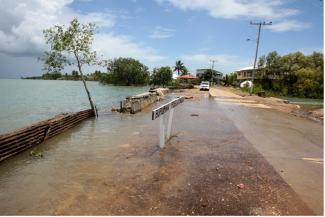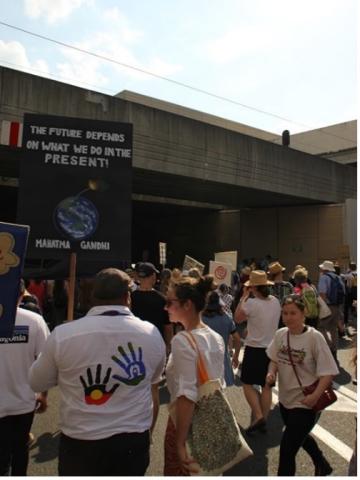Daniel Billy et al. v. Australia: Reasons for Australian Climate Justice Optimism

Sam Rooney
JD Candidate
Jan 23, 2023

The recent United Nations Human Rights Committee decision of Daniel Billy et al v Australia (the ‘decision’) has brought a wave of climate policy optimism to Australian news media. This optimism is well founded, given the decision’s ability to serve as a ‘focusing event’, that is, one capable of breaking Australia’s current climate policy paralysis. The significance of the decision and its ability to operate as a focusing event, cannot, however, be understood in isolation. Rather, the decision needs to be properly contextualized for the optimistic outlook of Australian climate policy to be realized.
The Decision
The claim before the UNHRC was brought by eight Torres Strait Islanders and six of their children (the ‘claimants’). The Torres Strait Islands are those located north of Queensland (Australia), home to the Torres Strait Islander peoples of whom the claimants represent. Torres Strait Islanders are the traditional custodians of the land and one of Australia’s two distinct First Nations groups, the other being Aboriginal persons. The claimants argued that the Australian government’s inaction on climate change violated their rights under the International Covenant on Civil and Political Rights (ICCPR). The claimants specifically alleged, that the Australian government had failed to implement appropriate measures to ensure the ‘long-term habitability’ of the islands. It was also argued that the government had failed to mitigate against the impacts of climate change. In delivering its decision, the UNHRC made several findings which have undeniably lowered the bar for future claims.

Firstly, the UNHRC found the claimants to be ‘victims’, that is, persons affected by climate change. This allegation surviving the Australian government’s challenge that the harm had not ‘presently materialized’ and thus, was not actionable. The UNHRC found that due to the high risk faced and the impacts already suffered, the risk of impairment to rights was ‘more than a theoretical possibility.’
Secondly, the UNHRC found that the failure by the Australian government to implement timely and adequate measures to protect the claimants was in violation of the claimant’s right to be free of arbitrary interferences (Article 17) and the right to enjoy their culture (Article 27). The temporal dimension of this finding is particularly significant, signaling a positive duty on all member states to take timely action to protect its citizens.
The UNHRC also made several findings when considering the claimants’ right to enjoy their culture. It found that a variety of factors, including, the loss of traditional and ancestral lands, agricultural lands, and cultural sites, impacted the claimants’ ability to practice their culture. A finding which should favour vulnerable claimant groups.
The decision’s deeper significance lies, however, not in the enunciation of any specific legal principle, but in its ability to act as a ‘focusing event’. That is, one which brings Australia’s climate change inadequacies to the forefront of public consciousness.
What is a Focusing Event?
The term ‘focusing event’ was coined by John Kingdon to describe events that spur major political change when coupled with a crisis. The notion of focusing events has also been explored in punctuated equilibrium theory, focusing on the event’s ability to center public attention and shift the political landscape from negative to positive feedback. Periods of positive feedback being those which produce significant change in the policy agenda.
Isolating a ‘focusing event’ is not an easy feat and is typically performed in hindsight. Academic research has nonetheless revealed several commonalities of focusing events, including, suddenness, scale, and simultaneous discovery of the event (that is, where both the general public and policy makers alike are made aware of the event ‘simultaneously’). Such characteristics fail to apply to events concerning issues already circulating in the public domain, of which the UNHRC decision is a type. Several academics, have, however demonstrated that focusing events need not be so narrowly confined, using events such as the Three Mile Island nuclear disaster to show that the possibility remains for an event to shift policy image, focus attention and influence policy outputs, notwithstanding pre-existing knowledge of the issue. That is, a positive feedback environment may be in its infancy, awaiting an event to ‘tip’ the balance (a ‘tipping event’). To predict whether the UNHRC decision can operate as a tipping event, the message, the messenger and the receptiveness of the policy environment must be considered.
The Decision as a Tipping Event
Tipping events take their meaning from the actors seeking to gain an advantage from their occurrence. The message of the UNHRC decision is distinctive. It does not peddle a narrative of emergency or despair, rather, it is an emotional appeal interlaced with hope for positive action. This makes it a particularly ‘sticky’ message, particularly when viewed in light of an Australian public that is pro-climate action.
The message also enjoys wide dissemination from two sources, first, the decision’s publication by the UNHRC and second, its dissemination to the masses through various news media outlets. This two-fold process is particularly important as the decisions publication helps to legitimize the call for change made in mainstream media. This legitimacy is key, given that events typically cited as evidence of climate change such as bushfires and storms, lack the ‘rupture’ necessary to signal that the ground has shifted. Such ambiguity, rendering ‘climate change a particularly deniable event.’

Tipping events are also dependent upon the policy environment, and several indicators suggest an appetite for change in the Australian context. Perhaps the most pertinent example being the 2022 federal election, which saw a pro-climate Labor government take power. This is also supported by empirical evidence with 75% of Australian’s reportedly concerned over climate change and 82% supportive of phasing out coal-fired power stations.
Since taking office, the Labor government has been quick to act on its pro-climate stance, introducing the Climate Change Act 2022. While predominantly serving as umbrella legislation, this Act shows early signs of positive feedback in the policy domain. This is a significant transition for a country, that academics considered a mere 2 years ago to be more responsive to prevailing narratives of fossil fuel centrality than to evidenced-based climate change policy.
The decision should further focus public attention on climate change and incentivize action by the legislature, so as, (at the very least) to avoid further breaches of the ICCPR. While the decision is not itself legally binding, public sentiment over climate change action suggests that there is no room for complacency, particularly given the decision’s traction in the media.
Daniel Billy v Australia as an ‘Emergent Hazard’?
There has been significant academic attention to focusing events following the COVID-19 pandemic. Useful parallels can be drawn with the UNHRC decision, given that the pandemic too, fails to fit neatly into the focusing event criteria. Academics have noted that the pandemic exhibits many, but not all characteristics of a focusing event. This has led some researchers to develop a different approach when considering ‘long duration, rapid accumulation’ events and to instead focus on the events’ timing and impact as the central enquiry. Climate change, much like the pandemic, is an issue of long duration, with periods of rapid accumulation. If timing is central, then the UNHRC decision sits as a clear point of inflection for change in the current context.
Conclusion
The decision has the potential to serve as a tipping event a conclusion supported by the message assigned to the decision, the quality of the messenger and the widespread public dissemination of the message. This dissemination has occurred in an Australian policy environment showing signs of positive feedback in favour of climate change action. In this environment, the executive can no longer slip back into complacency, due to mounting public pressure and the threat of further claims, that would only tarnish the government’s pro-climate action stance.
- Centre for Law and the Environment

